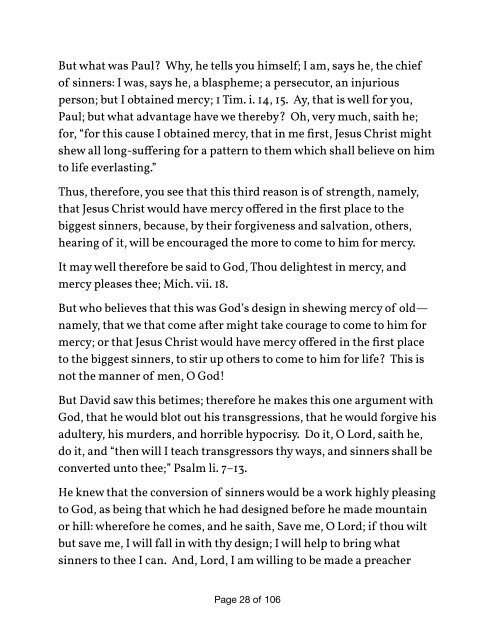The Jerusalem Sinner Saved; or Good News for the Vilest of Men by John Bunyan 1689
An encouraging book for those who feel guilty about their sins. It is a wonderful reminder that Christ's grace to his people knows no bounds and that his power to save even the worst sinner is not limited. "I have been vile myself, but I have obtained mercy; and I would have my companions in sin partake of mercy too: and therefore, I have writ this little book." Thus wrote John Bunyan about this unique gem. The premise of this book is that Jesus wanted his disciples to proclaim the gospel to the worst of sinners - those in Jerusalem who crucified their Messiah. To Bunyan's mind, this was the worst possible sin. The apostles were to begin there, with these worst of sinners, because, in Christ's eyes, they had the greatest need. Also, when they believed in Christ, his name would receive the greatest fame, and thus others would be encouraged to come to Christ. The kingdom of Satan would then be weakened, and the tempted and the weak would be helped. Further, the greatest sinners would love Christ the most when saved, and those who refused to repent would be left with no excuse. To Bunyan's way of thinking, this command to preach the gospel to "Jerusalem sinners" shows the gracious intentions of Christ toward men and his sufficiency to save the worst of sinners, and gives encouragement to those who think that their sin is too great to be forgiven.
An encouraging book for those who feel guilty about their sins. It is a wonderful reminder that Christ's grace to his people knows no bounds and that his power to save even the worst sinner is not limited.
"I have been vile myself, but I have obtained mercy; and I would have my companions in sin partake of mercy too: and therefore, I have writ this little book." Thus wrote John Bunyan about this unique gem.
The premise of this book is that Jesus wanted his disciples to proclaim the gospel to the worst of sinners - those in Jerusalem who crucified their Messiah. To Bunyan's mind, this was the worst possible sin. The apostles were to begin there, with these worst of sinners, because, in Christ's eyes, they had the greatest need. Also, when they believed in Christ, his name would receive the greatest fame, and thus others would be encouraged to come to Christ. The kingdom of Satan would then be weakened, and the tempted and the weak would be helped. Further, the greatest sinners would love Christ the most when saved, and those who refused to repent would be left with no excuse. To Bunyan's way of thinking, this command to preach the gospel to "Jerusalem sinners" shows the gracious intentions of Christ toward men and his sufficiency to save the worst of sinners, and gives encouragement to those who think that their sin is too great to be forgiven.
You also want an ePaper? Increase the reach of your titles
YUMPU automatically turns print PDFs into web optimized ePapers that Google loves.
But what was Paul? Why, he tells you himself; I am, says he, <strong>the</strong> chief<br />
<strong>of</strong> sinners: I was, says he, a blaspheme; a persecut<strong>or</strong>, an injurious<br />
person; but I obtained mercy; 1 Tim. i. 14, 15. Ay, that is well f<strong>or</strong> you,<br />
Paul; but what advantage have we <strong>the</strong>re<strong>by</strong>? Oh, very much, saith he;<br />
f<strong>or</strong>, “f<strong>or</strong> this cause I obtained mercy, that in me first, Jesus Christ might<br />
shew all long-suffering f<strong>or</strong> a pattern to <strong>the</strong>m which shall believe on him<br />
to life everlasting.”<br />
Thus, <strong>the</strong>ref<strong>or</strong>e, you see that this third reason is <strong>of</strong> strength, namely,<br />
that Jesus Christ would have mercy <strong>of</strong>fered in <strong>the</strong> first place to <strong>the</strong><br />
biggest sinners, because, <strong>by</strong> <strong>the</strong>ir f<strong>or</strong>giveness and salvation, o<strong>the</strong>rs,<br />
hearing <strong>of</strong> it, will be encouraged <strong>the</strong> m<strong>or</strong>e to come to him f<strong>or</strong> mercy.<br />
It may well <strong>the</strong>ref<strong>or</strong>e be said to God, Thou delightest in mercy, and<br />
mercy pleases <strong>the</strong>e; Mich. vii. 18.<br />
But who believes that this was God’s design in shewing mercy <strong>of</strong> old—<br />
namely, that we that come after might take courage to come to him f<strong>or</strong><br />
mercy; <strong>or</strong> that Jesus Christ would have mercy <strong>of</strong>fered in <strong>the</strong> first place<br />
to <strong>the</strong> biggest sinners, to stir up o<strong>the</strong>rs to come to him f<strong>or</strong> life? This is<br />
not <strong>the</strong> manner <strong>of</strong> men, O God!<br />
But David saw this betimes; <strong>the</strong>ref<strong>or</strong>e he makes this one argument with<br />
God, that he would blot out his transgressions, that he would f<strong>or</strong>give his<br />
adultery, his murders, and h<strong>or</strong>rible hypocrisy. Do it, O L<strong>or</strong>d, saith he,<br />
do it, and “<strong>the</strong>n will I teach transgress<strong>or</strong>s thy ways, and sinners shall be<br />
converted unto <strong>the</strong>e;” Psalm li. 7–13.<br />
He knew that <strong>the</strong> conversion <strong>of</strong> sinners would be a w<strong>or</strong>k highly pleasing<br />
to God, as being that which he had designed bef<strong>or</strong>e he made mountain<br />
<strong>or</strong> hill: wheref<strong>or</strong>e he comes, and he saith, Save me, O L<strong>or</strong>d; if thou wilt<br />
but save me, I will fall in with thy design; I will help to bring what<br />
sinners to <strong>the</strong>e I can. And, L<strong>or</strong>d, I am willing to be made a preacher<br />
Page<br />
28 <strong>of</strong> 106

















